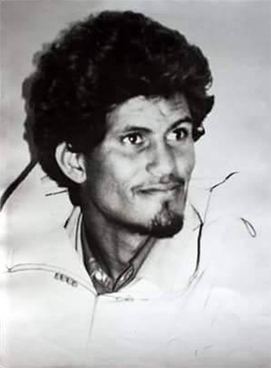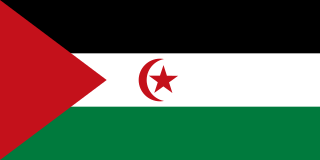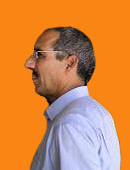
All data about demographic information regarding Western Sahara is extremely error-prone, regardless of source. Most countries take censuses every ten years, and some every five in order to stay abreast of change and miscounts; the last count was conducted in 1970, and even that data by colonial Spain is considered unreliable due to large nomadic populations.

The United Nations Mission for the Referendum in Western Sahara is the United Nations peacekeeping mission in Western Sahara, established in 1991 under United Nations Security Council Resolution 690 as part of the Settlement Plan, which had paved way for a cease-fire in the conflict between Morocco and the Polisario Front over the contested territory of Western Sahara.

The Sahrawi Arab Democratic Republic (SADR) claims the Western Sahara, a territory largely administered by Morocco since Spain abandoned it in 1975. The sovereignty over Western Sahara is unresolved: the territory is contested by Morocco and Polisario Front, which in February 1976 formally proclaimed a government-in-exile of the SADR. The United Nations, which considers Western Sahara a non-decolonized territory, is attempting to hold a referendum on the issue through the mission Minurso. The UN-administered cease-fire has been in effect since September 1991.

Mohamed Abdelaziz was the 3rd Secretary General of the Polisario Front, from 1976, and the 1st President of the Sahrawi Arab Democratic Republic from 1982, until his death in 2016.

El-Ouali Mustapha Sayed was a Sahrawi nationalist leader, co-founder and second Secretary-General of the Polisario Front.

Tifariti is an oasis town located in north-eastern Western Sahara, east of the Moroccan Berm, 138 km (86 mi) from Smara and 15 km (9 mi) north of the border with Mauritania. It is part of what Polisario Front calls the Liberated Territories and Morocco call the Buffer Zone. It has been the de facto temporary capital of the Sahrawi Arab Democratic Republic since the government moved there in 2008 from Bir Lehlou. It is the headquarters of the 2nd military region of the SADR.

Mahfoud Ali Beiba Hammad Dueihi was a Sahrawi politician and co-founder of the Polisario Front, a national liberation movement that seeks self-determination for Western Sahara. From 1975 until his death, he lived in an exile in the refugee camps of Tindouf, Algeria.

The Free Zone or Liberated Territories is a term used by the Polisario Front government of the Sahrawi Arab Democratic Republic, a partially recognized sovereign state in the western Maghreb, to describe the part of Western Sahara that lies to the east of a 2,200-kilometre (1,400 mi) border wall flanked by a minefield, often referred as the Berm, and to the west and north of the borders with Algeria and Mauritania, respectively. It is controlled by the Sahrawi Arab Democratic Republic, as opposed to the area to the west of the Berm, which is controlled by Morocco as part of its Southern Provinces. Both states claim the entirety of Western Sahara as their territory.

The Sahrawi National Council (SNC) or Sahrawi Parliament is the legislature of the Sahrawi Arab Democratic Republic. Its structure and competences are guided by the Constitution of the Sahrawi Arab Democratic Republic (SADR). The present speaker since 2020 is Hamma Salama.

The foreign relations of the Sahrawi Arab Democratic Republic (SADR) are conducted by the Polisario Front, which maintains a network of representation offices and embassies in foreign countries.

The politics of the Sahrawi Arab Democratic Republic refers to politics of the Polisario Front's proclaimed Sahrawi Arab Democratic Republic, a country in North Africa with limited recognition by other states, controlling parts of the Western Sahara region.

The Manhasset negotiations were a series of talks that took place in four rounds in 2007–2008 at Manhasset, New York between the Moroccan government and the representatives of the Saharawi liberation movement, the Polisario Front to resolve the Western Sahara conflict. They were considered the first direct negotiations in seven years between the two parties. Also present at the negotiations were the neighboring countries of Algeria and Mauritania.

Brahim Ghali is a Sahrawi politician, military officer and current president of the Sahrawi Arab Democratic Republic (SADR), formerly its ambassador to Algeria and Spain.

The SahrawiArab Democratic Republic, also known as Western Sahara, is a partially recognized state, recognised by 45 UN member states, located in the western Maghreb, which claims the non-self-governing territory of Western Sahara, but controls only the easternmost one-fifth of that territory. Between 1884 and 1975, Western Sahara was known as Spanish Sahara, a Spanish colony. The SADR is one of the two African states in which Spanish is a significant language, the other being Equatorial Guinea.

Luchaa Mohamed-Lamin, also known as Obeid Luchaa was a Sahrawi politician, diplomat and co-founder of the Polisario Front, a national liberation movement that seeks self-determination for Western Sahara. One of his daughters is Nadhira Mohamed, who was the protagonist of the Spanish film Wilaya.

Women in the Sahrawi Arab Democratic Republic are women who were born in, who live in, or are from the Sahrawi Arab Democratic Republic in the region of the Western Sahara or the Sahrawi refugee camps. In Sahrawi society, the women share responsibilities at every level of its community and social organization. Article 41 of the Constitution of the Sahrawi Arab Democratic Republic ensures that the state will pursue "the promotion of women and [their] political, social and cultural participation, in the construction of society and the country's development".

Elections to the Sahrawi National Council were held between 19 and 21 February 2012. The elections were only held in the Free Zone of Western Sahara and in Sahrawi refugee camps in Algeria, the rest of Western Sahara being under the de facto administration of Morocco. The elections were held after the 13th Congress of the Polisario Front, which took place two months earlier between 15 and 22 December 2011. The percentage of young people in the new Council stood at 42%, while women gained 25% of seats. Khatri Addouh was reelected Speaker of the Council on 28 February 2012.

Khatri Addouh is a former president of the Sahrawi Arab Democratic Republic and the president of the Sahrawi National Council from 2010 to 2020. He was appointed as the Acting President and the Secretary General of the Polisario Front upon the death of his long time aide President Mohamed Abdelaziz on 31 May 2016.

Legislative elections were held in the Sahrawi Republic on 8–9 March 2020 to elect 52 of the 53 members of the Sahrawi National Council, the unicameral parliament of the SADR. More than 100,000 Sahrawis were registered to vote, with 145 candidates contesting the elections.













